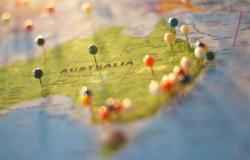Australia’s New International World

Brian Stoddart unpicks Australia's foreign policy debates, including its new “love in” with China, warm words for India and the need to pacify America over the Pacific.
As an underwhelmed Australian electorate trudges towards a 21 May federal election and its choice between the evil of two lessers as the great American commentator David Brinkley, among others, once put it, foreign policy might just be a surprise factor.
More precisely, potential shifts in that policy may well figure in voter thinking. The ruling Liberal-National coalition led by Prime Minister Scott Morrison has throughout its present term bashed China at every possible turn. Right now, that focuses on China’s deal to establish a military base in the Solomon Islands, about four hours flying time from Canberra. This clearly has the capacity to change the nature of strategic thinking about the Pacific, and defence commentators have run all measure of gloom and doom.
This new agreement has much to do with Australia’s recent approach to a Pacific strategy, with the government’s view shifting back to that which dominated things from 1945 onwards – stick with Washington and everything else will fall into place. Among other things, that led to the 2013 abolition of AusAID, the aid and development-focused agency that led Australia’s efforts in the region, and a sharp reduction in the aid budget overall.
China’s on-going activities across the Pacific refocused Canberra’s commitment to the American approach and really downplayed the importance of Pacific nations themselves. The prime example? At the last moment before the Solomons-China agreement was signed, Canberra sent Zed Seselja, Minister for International Development and the Pacific to Honiara. He is not even in Cabinet and for many that signalled Government priorities.
Meanwhile, the Opposition Labor Party led by Anthony Albanese, looking for the victory they thought they had last time round, has more or less joined in on the China bashing but raising anxiety in so doing. Deputy Leader Richard Marles is being attacked for what are seen to be “pro-China” views. At the time those remarks were made they were reasonable enough, emphasising dialogue rather than fear mongering. Now, though, he stands accused of having a speech delivered in China vetted and approved in advance by Chinese authorities.
At a moment when China is Australian public enemy number one, that has become part of the election campaign rhetoric. That voting public, then, is seeing from both major parties an essentially belligerent approach to the world’s emerging number one economic and strategic power.
And it is at that point that India has emerged to provide further twists. Australia’s new “love in” with China is well documented, Canberra at long last taking seriously the power that dominates the Indian Ocean on the whole of Australia’s western flank. Much of that new interest is in trade, commerce, education and services, but it also now has a heavy emphasis on defence and security.
China has had a role in driving this new alliance, with its so-called “String of Pearls” initiative and its presence and investment in Africa prompting concern. That led directly to the emergence of “The Quad” and creation of the Indo-Pacific strategic terminology. The combination of India, Japan, Australia and the USA was openly touted as a counter to China and its strategic push across the entire region.
Except that India differs with its Quad partners on some issues. The obvious example here is India not joining the Quad condemnation of Russia for its invasion of Ukraine. That stemmed from India’s long relationship with Russia but inevitably was linked by some to Russia’s connection with and support from China.
So Australia is charging ahead with its new passage to India for a host of reasons, but that is part of an overall reshaping of the international outlook and not just a bilateral initiative.
But for any interested voter it is difficult to find a clear picture about what that new strategic outlook might look like under either of the potential new governments. The Liberal ‘plan’ is heavy on defence and security. But so, too, is Labor’s. Independent assessments are similarly sketchy, simply because the major parties are chary of making definitive statements as distinct from attacking the other side’s imagined mistakes of omission and commission.
As an aside, though, there is one area where both parties have strong interest – those marginal electorates where Chinese and Indian communities have a strong presence (bearing in mind that little attention seems to be paid to the idea that cultural and linguistic differences inside those communities might have a role to play). What is now a concern in the thinking of both parties is how the recent China bashing might impact on voting patterns within the Chinese communities that have been responsible for significant upsets in the recent past.
What we will see for the next few weeks, then, is each major party attempting to: blackguard the other over China, cosy up to India, mention ASEAN when necessary (Labor has a statement on that so will probably lead the way), pacify America over the Pacific, emphasise security and maintain border sovereignty.
But we will not likely see much enlightenment on just where Australia will sit in an emerging new world order.
Brian Stoddart is Emeritus Professor at La Trobe University in Melbourne, Australia where he served as Vice-Chancellor, a higher education consultant internationally, a regular commentator on global issues, cruise ship lecturer, and a crime fiction writer.
Photo by Catarina Sousa


